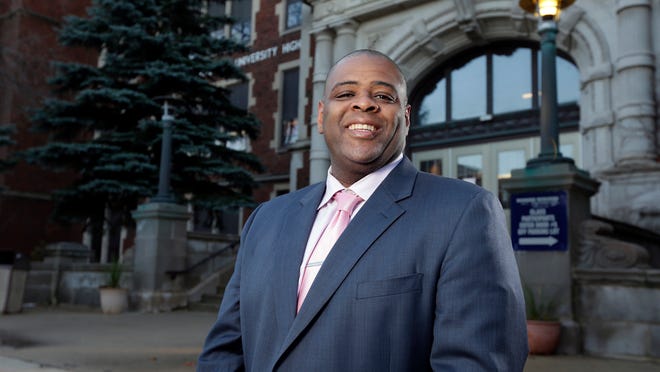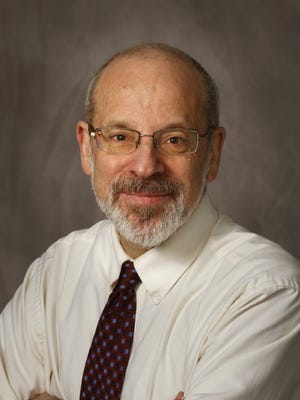Borsuk: Demond Means' parting words as he exits the Milwaukee education scene
“It’s been good to be in Wisconsin. I can’t wait to get to Georgia.”

No, this isn’t 1965 with the Milwaukee Braves heading for Atlanta, although I’m old enough to remember that scarring experience.
And the owners of the Braves weren’t nearly as positive-minded and diplomatic as Demond Means, the person who said those words to me a few days ago.
Means is in his last several days as superintendent of Mequon-Thiensville schools. On July 10, he becomes superintendent of Clarke County, Ga., which includes Athens, home of the University of Georgia.

Superintendents come and go, but this departure merits particular attention. So a few thoughts from and about Means.
“How can we come to a common ground on how we can make this thing work?” That is Means’ main message for people involved in the Milwaukee education scene at this point.
“We have engaged in debates vs. dialogue,” he said.
RELATED:Borsuk: Character counts — and these 6 schools prove it
RELATED:Borsuk: Wisconsin law doesn't seek equal funding for every school child. Here's why.
Dialogue means trying to understand others. And dialogue, with genuine, broad-based commitment to setting and pursuing goals for realistic improvement, is necessary for change to occur, Means said.
“We have politicized education policy. ... If you’re not on a certain team, you don’t talk to each other.“
Everybody knows the ways that division plays out around here. By race. By economic status. By where you live. By political views. Milwaukee and Wisconsin don’t have monopolies on polarization, but, wow, we sure are good at it.
Means has seen a lot from both sides of these lines. He’s an African-American man who grew up in the heart of Milwaukee and he has spent more than two decades working in suburban, mostly white schools. He’s making a good living now, but he is still closely connected to people who aren’t.
He has a long history of advocating for public schools, but he got a lot of heat a year ago from public school activists because of his involvement in a Republican-created effort to reform some Milwaukee schools, an idea that bombed.
ARCHIVES:Demond Means brings 'servant leader' approach to tall MPS task
And Means has been one of the people at the front of advocacy for integration of schools and efforts to close achievement gaps, which some would call exercises in frustration.
Means has only glowing things to say about Mequon-Thiensville. He was an administrator in the district 12 years, including nine as superintendent, a pretty long run.
The district is high-performing (and well-to-do), but Means says he and the community shared a commitment to always seeking ways to do better. He said that is an example of one of his biggest points: When people are in alignment around doing what’s best for kids, good things happen. He is convinced that could be true in more challenging places than Mequon-Thiensville.
RELATED:Public school officials push back on bills aimed at slowing referendums
RELATED:No room for raises in MPS' $1.18 billion preliminary budget
Means' advocacy for equity for minority students frequently took him beyond Mequon.
He was a strong advocate for continuing and reinvigorating the long-standing Chapter 220 voluntary city-suburban school integration effort as it dwindled in recent years. Not many people seemed to care, and the Legislature quietly ended new enrollment in the program in 2015.
Means was one of several educators who launched a group called the Closing the Gap Consortium in 2012. Now, more than 15 school districts in southeastern Wisconsin and several parochial school organizations are members.
They meet every couple of months or so to discuss issues of mutual interest and ways to collaborate on things such as building more diverse teaching staffs. It’s not a vehicle for dramatic change, but it’s a step toward working together.
And Means remains enthusiastic about the work of a statewide task force created by Tony Evers, state superintendent of public instruction. It issued a report in 2014, “Promoting Excellence for All.” Means chaired the task force and says its recommendations would lead to improvements, if followed. There isn’t much evidence of momentum around that.
An angry mess
And then there was the Opportunity Schools plan that Republicans put in the state budget two years ago. It called for Milwaukee County Executive Chris Abele to name a commissioner who would work on turning around several low-performing Milwaukee Public Schools. Means was named commissioner.

It was, in short, an angry mess and nothing came of it. Means declined to talk about it, except to say he stands behind the statement he issued when he quit as commissioner a year ago.
“It has become clear to me that the Opportunity Schools and Partnership Program law will become increasingly adversarial at a time when adversity is the last thing our children need,” he said then. The environment “is not conducive to collaborative partnerships.”
Means said that episode had nothing to do with his decision to leave the Milwaukee area.
If Means' work in Mequon-Thiensville is done, the broader Milwaukee area issues he worked on are far from resolved. Some critics consider his efforts a lot of talk and not much action.
My verdict is kinder. In urban areas that have less severe problems than Milwaukee, the overall climate around education is a lot healthier and more cooperative than around here. Means said the 13,000-student district he will lead in Georgia (four times the size of Mequon-Thiensville) has a wide-range of students, but there is community-wide support for making schools and students successful. He smiled as he said that.
In the Milwaukee area, there have been some positive steps toward working together in recent years, mostly at the grassroots level. But especially in the city, this remains a place where unfriendly competition between sectors and schools, life in organizational silos, and just plain unhappy politics are alive and well. Our motto is not, “We’re all in this together.”
Maybe Means is right that talking together more would be a step forward, especially if it were the right conversation. He asked, “If you’re not having that conversation (on improvement), then what are you doing?”
Alan J. Borsuk issenior fellow in law and public policy at Marquette Law School. Reach him atalan.borsuk@marquette.edu .